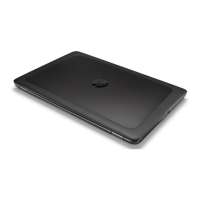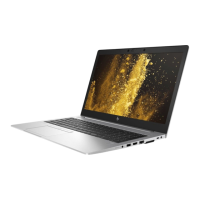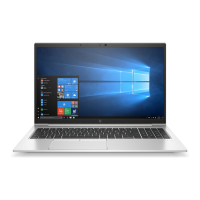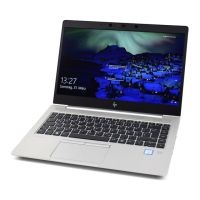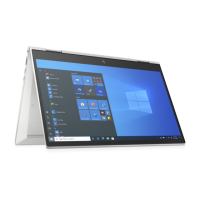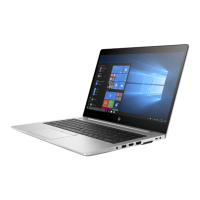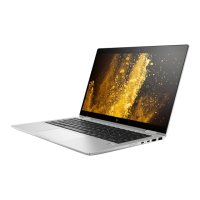Do you have a question about the HP EliteBook 850 G5 Notebook PC and is the answer not in the manual?
Details on Intel Core processors used in the HP EliteBook 850 G5 Notebook PC.
Information about the integrated chipset and its capabilities.
Information on integrated and external graphics capabilities, including display support.
Details on display panel types, resolutions, brightness, and features like privacy filters.
Information on memory module slots, types, and maximum supported RAM configurations.
Details on available M.2 PCIe and SATA solid-state drive configurations.
Description of audio capabilities and webcam specifications.
Details on Ethernet connection, WLAN, WWAN, and NFC capabilities.
List and description of various ports including USB Type-C, HDMI, and docking connectors.
Information on the keyboard layout, TouchPad, and pointing stick.
Specifications for battery options and AC adapter types.
Details on security lock, TPM, fingerprint reader, and smart card reader.
List of preinstalled Windows operating system versions.
Information on end-user replaceable parts.
Identification and description of ports and slots on the right side of the notebook.
Identification and description of security slot, vents, and smart card reader on the left.
Details on display panel features like antennas, cameras, and microphones.
Components within the keyboard area including TouchPad, pointing stick, and NFC.
Explanation of various status lights on the keyboard area, such as power and wireless indicators.
Description of power button, speakers, and fingerprint reader functionality.
Overview of special keys like Fn, Esc, Windows, and their functions.
Explanation of the functions performed by action keys based on their icons.
Details on hot key combinations using the Fn key and other keys.
Identification of vents on the bottom of the notebook for cooling.
Description of front-facing status lights: power, wireless, and drive activity.
Details on internal microphones located on the cover.
Information on identifying service, regulatory, and wireless certification labels on the computer.
List and spare part numbers for main replaceable components of the notebook.
Detailed list and spare part numbers for parts within the display assembly.
List of cables included in the cable kit with their respective part numbers.
Contents of the plastics kit, including SIM card, fingerprint, and smart card reader inserts.
Catalog of miscellaneous parts such as AC adapters and power cords.
Required tools, general service precautions, and handling of plastic parts.
Guidelines for handling cables, drives, and essential grounding procedures for ESD prevention.
Detailed guidelines for packaging, transporting, workstation setup, and equipment for preventing ESD damage.
Procedure for removing and replacing the bottom cover.
Steps to remove and install M.2 PCIe and SATA solid-state drives.
Instructions for removing and installing memory modules.
Procedure for removing and replacing the WLAN/Bluetooth card.
Steps to remove and install the WWAN module.
Detailed guide for removing and replacing the keyboard assembly.
Procedure for safely removing and installing the computer's battery.
Steps for removing and replacing the heat sink assembly, including thermal material.
Instructions for removing and replacing the Real-Time Clock battery.
Procedure for removing and replacing the USB board.
Steps for removing and replacing the RJ-45 network port assembly.
Guide for removing and replacing the power button board.
Procedure for removing and replacing the speaker assembly.
Steps for removing and installing the fingerprint reader assembly.
Instructions for removing and replacing the TouchPad module.
Procedure for removing and installing the pointing stick module.
Steps to remove and replace the NFC module.
Guide for removing and installing the smart card reader.
Procedure for removing and replacing the system cooling fan.
Detailed steps for removing and replacing the main system board.
Instructions for removing and replacing the entire display assembly.
Information regarding the top cover, which remains after other parts are removed.
Explanation of error categories based on the number of long beeps or blinks.
Details on how blink and beep error code sequences are determined and interpreted.
Steps to initiate HP PC Hardware Diagnostics (UEFI) from the system startup menu.
Instructions for downloading the HP PC Hardware Diagnostics (UEFI) tool onto a USB drive.
Methods for creating system recovery media and backups using HP tools or Windows.
Overview of options for restoring the system, including HP Recovery Manager and Factory Reset.
Procedure for recovering the system using HP Recovery media.
Instructions on how to modify the boot order in BIOS to boot from specific devices.
Steps to remove the HP Recovery partition to free up hard drive space.
Guide to navigating and using the BIOS/UEFI setup utility for system configuration.
Instructions for checking BIOS version and downloading/installing BIOS updates.
Configuration options for TPM and HP Sure Start features within Computer Setup.
General technical specifications for the HP EliteBook 850 G5 Notebook PC.
Detailed specifications for the 39.6-cm (15.6-in) display panel.
Technical specifications for M.2 PCIe and SATA solid-state drives.
Requirements applicable to all countries for power cord sets, including length and electrical ratings.
Details on accredited agencies and notes for specific countries and regions regarding power cords.
Instructions for restoring BIOS settings and managing nonvolatile memory containing personal data.
Table detailing types of nonvolatile memory, their purpose, and data handling.
Answers to common questions regarding BIOS, UEFI, and security settings.
